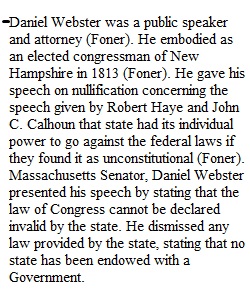


Q 1) Under what grounds does Daniel Webster (Document #1) oppose the ability of a state to nullify federal laws, also known as the Doctrine of Nullification? What justifications does South Carolina (Document #2) employ to defend their decision to nullify federal laws? In comparing these two primary documents, whose arguments regarding the concept of nullification are most persuasive to you and why? 2) How did the Dred Scott Decision (Document #3) support the pro-slavery arguments regarding the ability of the federal government to restrict the expansion of slavery? What position did this Supreme Court decision assign people of African descent in the United States of America? What inconsistencies does Frederick Douglass (Document #4) identify with the founding principles of the nation and the current status of people of African descent within it? In what ways does the Dred Scott Decision confirm and/or challenge Douglass’ arguments? 3) What is the “irrepressible conflict” according to William H. Seward (Document #5) and how does he specifically define the two sides involved? How does Alexander Stephens (Document #6) define the Confederacy and why does he believe secession is justified and necessary? How does President Lincoln (Document #7) frame the Civil War and effort to restore the Union as a moral imperative? 4) In thinking about these primary documents and what you have learned in your course, should states have the power to nullify federal laws if they disagree with them? Why or why not? As part of your response, provide a specific case or issue (political, economic, social, or cultural) within the United States from the end of the Civil War until the present day where you could imagine a scenario in which nullification could play out and reflect upon both the positive and negative consequences of such action.
View Related Questions